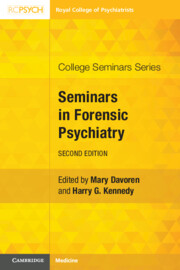Book contents
- Seminars in Forensic Psychiatry
- College Seminars Series
- Seminars in Forensic Psychiatry
- Copyright page
- Contents
- Contributors
- Foreword
- Introduction
- Chapter 1 Violence and Mental Disorder
- Chapter 2 Violence and Mental Disorder
- Chapter 3 Outcomes from the Key Inquiries and the Evolution of Modern Forensic Psychiatry
- Chapter 4 Prison Psychiatry
- Chapter 5 Legal Issues and Expertise in Forensic Psychiatry
- Chapter 6 Expertise, Structured Professional Judgement and Risk Assessment
- Chapter 7 Models of Care in Forensic Psychiatry
- Chapter 8 Psychopharmacology of Chronic Aggression and Violence in Forensic Settings
- Chapter 9 Ward Milieu and the Management of In-Patient Violence
- Chapter 10 Community Forensic Psychiatry Including Liaison with Health, Criminal Justice and Public Protection Agencies
- Chapter 11 Assessment of Personality Disorder, Psychopathy and Associated Offending Behaviour
- Chapter 12 Stalking and Threats to Harm and Kill
- Chapter 13 Sexual Offending
- Chapter 14 Terrorism-Related Assessments
- Chapter 15 Forensic Psychotherapy and Psychological Therapies in Forensic Mental Health Settings
- Chapter 16 Forensic Aspects of Medical Negligence
- Chapter 17 Child and Adolescent Forensic Mental Health Services
- Chapter 18 Women’s Services in Forensic Psychiatry
- Chapter 19 Forensic Psychiatry and Intellectual Disability
- Chapter 20 Cultural Service Delivery in Forensic Mental Health Services
- Chapter 21 Tackling Ethnic Inequality in Forensic Mental Healthcare
- Chapter 22 Academic Forensic Psychiatry
- Chapter 23 The No-Nonsense Guides
- Index
- References
Chapter 1 - Violence and Mental Disorder
The Evidence
Published online by Cambridge University Press: 06 June 2024
- Seminars in Forensic Psychiatry
- College Seminars Series
- Seminars in Forensic Psychiatry
- Copyright page
- Contents
- Contributors
- Foreword
- Introduction
- Chapter 1 Violence and Mental Disorder
- Chapter 2 Violence and Mental Disorder
- Chapter 3 Outcomes from the Key Inquiries and the Evolution of Modern Forensic Psychiatry
- Chapter 4 Prison Psychiatry
- Chapter 5 Legal Issues and Expertise in Forensic Psychiatry
- Chapter 6 Expertise, Structured Professional Judgement and Risk Assessment
- Chapter 7 Models of Care in Forensic Psychiatry
- Chapter 8 Psychopharmacology of Chronic Aggression and Violence in Forensic Settings
- Chapter 9 Ward Milieu and the Management of In-Patient Violence
- Chapter 10 Community Forensic Psychiatry Including Liaison with Health, Criminal Justice and Public Protection Agencies
- Chapter 11 Assessment of Personality Disorder, Psychopathy and Associated Offending Behaviour
- Chapter 12 Stalking and Threats to Harm and Kill
- Chapter 13 Sexual Offending
- Chapter 14 Terrorism-Related Assessments
- Chapter 15 Forensic Psychotherapy and Psychological Therapies in Forensic Mental Health Settings
- Chapter 16 Forensic Aspects of Medical Negligence
- Chapter 17 Child and Adolescent Forensic Mental Health Services
- Chapter 18 Women’s Services in Forensic Psychiatry
- Chapter 19 Forensic Psychiatry and Intellectual Disability
- Chapter 20 Cultural Service Delivery in Forensic Mental Health Services
- Chapter 21 Tackling Ethnic Inequality in Forensic Mental Healthcare
- Chapter 22 Academic Forensic Psychiatry
- Chapter 23 The No-Nonsense Guides
- Index
- References
Summary
The aims of this chapter are firstly to help trainees refine forensic assessments of offender patients so they can give advice to courts in determining an offender’s legal responsibility for a criminal act. Secondly, the chapter aims to help illuminate the motivation for violent offending and the pathways to violence. This is not only necessary for giving expert evidence in courts but is also essential in choosing the treatment that should be offered to a patient and the level of security required in which to deliver treatment. In some cases it may be relevant to the likelihood of a successful response to treatment. Thirdly, associations between criminal behaviour and mental disorder may be highly important in the assessment of risk of future offending. Finally, and most importantly, a good forensic assessment should concentrate on the future management and prevention of further violence. Although forensic psychiatrists should be experts in the assessment of violence among people with mental disorder, it is essential to develop expertise with those who have no evidence of mental disorder. Paradoxically, these cases are often the most challenging to understand and evaluate.
- Type
- Chapter
- Information
- Seminars in Forensic Psychiatry , pp. 3 - 35Publisher: Cambridge University PressPrint publication year: 2024

